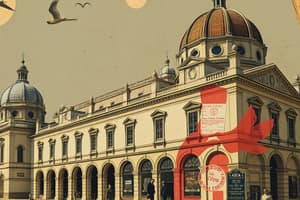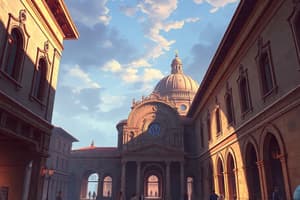Podcast
Questions and Answers
During which centuries did the Renaissance take place?
During which centuries did the Renaissance take place?
- 8th and 9th centuries
- 18th and 19th centuries
- 11th and 14th centuries
- 14th and 17th centuries (correct)
Where did the Renaissance originate?
Where did the Renaissance originate?
- England
- France
- Italy (correct)
- Spain
What was a key role played by the Medicis during the Renaissance?
What was a key role played by the Medicis during the Renaissance?
- Exploration of new continents
- Military leadership
- Promotion of agricultural advancements
- Financing the arts (correct)
What intellectual movement of the Renaissance emphasized human dignity and reason?
What intellectual movement of the Renaissance emphasized human dignity and reason?
What was one of the focuses of Humanism during the Renaissance?
What was one of the focuses of Humanism during the Renaissance?
Which movement marked the end of the Middle Ages and brought forth a period of advancements?
Which movement marked the end of the Middle Ages and brought forth a period of advancements?
Which artistic concept was emphasized by High Renaissance masters like Leonardo da Vinci and Michelangelo?
Which artistic concept was emphasized by High Renaissance masters like Leonardo da Vinci and Michelangelo?
What architectural principles were focused on by Renaissance architects like Filippo Brunelleschi and Andrea Palladio?
What architectural principles were focused on by Renaissance architects like Filippo Brunelleschi and Andrea Palladio?
Who challenged the centuries-old belief that the Earth was the center of the solar system during the Renaissance?
Who challenged the centuries-old belief that the Earth was the center of the solar system during the Renaissance?
What significant technological innovation by Johannes Gutenberg revolutionized the distribution of knowledge during the Renaissance?
What significant technological innovation by Johannes Gutenberg revolutionized the distribution of knowledge during the Renaissance?
What religious movement sought to reform the Catholic Church during the Renaissance?
What religious movement sought to reform the Catholic Church during the Renaissance?
Which aspect of the Renaissance legacy sparked a new era of exploration and discovery?
Which aspect of the Renaissance legacy sparked a new era of exploration and discovery?
Study Notes
The Renaissance: A Period of Rebirth and Discovery
The Renaissance, a term that originated in French, meaning "rebirth," was a significant cultural movement that unfolded across Europe between the 14th and 17th centuries. This period is often considered a pivotal moment in human history, as it marked the end of the Middle Ages and ushered in an era of intellectual, artistic, political, and economic advancements.
Renaissance Origins
The Renaissance began in Italy, particularly in Florence, where the rise of wealthy merchant families and the development of city-state governments provided the necessary conditions for intellectual and artistic flourishing. The patronage of powerful families like the Medicis, as well as ecclesiastical institutions like the Catholic Church, played a crucial role in financing the arts and fostering the exchange of ideas.
Humanism
One of the hallmarks of the Renaissance was the rediscovery and revival of classical learning, particularly the writings of ancient Roman and Greek philosophers, poets, and scholars. This intellectual movement, known as Humanism, emphasized the importance of human dignity, reason, and individualism. Humanists sought to re-establish a connection with the classics, believing that the study of Greek and Roman texts would help to enrich their own culture and society.
Art and Architecture
The visual arts experienced a significant revival during the Renaissance, as artists like Leonardo da Vinci, Raphael, and Michelangelo created works of such unparalleled beauty and technical mastery that they continue to influence art to this day. These artists, known as High Renaissance masters, focused on realism, perspective, and anatomical accuracy, thereby laying the foundation for the modern era of art.
Renaissance architecture, exemplified by the works of Filippo Brunelleschi and Andrea Palladio, sought to harmoniously combine practicality with aesthetic beauty. Their focus on mathematics, proportions, and symmetry laid the groundwork for the Baroque and Neoclassical styles that followed.
Science and Technology
The Renaissance was also a time of significant advancements in the scientific and technological fields. Scientists like Galileo Galilei and Nicolaus Copernicus challenged centuries-old beliefs about the cosmos, while inventors like Leonardo da Vinci and Johannes Gutenberg developed new technologies that would dramatically alter the course of human history.
Galileo Galilei's telescopic observations of the planets provided evidence supporting the Copernican heliocentric model, which posited that the Sun, rather than the Earth, was at the center of the solar system. Though this theory was controversial and met with resistance from the Church, it eventually gained widespread acceptance. Similarly, Johannes Gutenberg's invention of the printing press revolutionized the distribution of knowledge, making books more accessible to the general public.
The Reformation and Counter-Reformation
The Renaissance also coincided with the Reformation, a religious movement that sought to reform the Catholic Church and its practices. Martin Luther's publication of the 95 Theses in 1517 triggered a series of events that led to the formation of Protestant denominations, thereby challenging the Church's monopoly on religious thought. In response, the Catholic Church launched the Counter-Reformation, which aimed to reform and reassert its authority.
The Renaissance and Its Legacy
The Renaissance was a period of profound intellectual, artistic, and cultural change that laid the groundwork for many of the advancements and achievements that would follow. Though the Renaissance may have begun in Italy, its influence spread throughout Europe and beyond, shaping the arts, sciences, and politics of Western civilization.
The Renaissance's emphasis on individualism and humanism sparked a new era of exploration and discovery, as Europeans sought to expand their knowledge of the world and their place within it. The Renaissance's legacy can be seen in the sciences, arts, and humanities, as well as in the democratic, liberal, and secular values that continue to shape Western society.
As we continue to explore the world and seek to better understand the human condition, the lessons of the Renaissance remain as relevant today as they were centuries ago. By embracing the spirit of curiosity, innovation, and individualism, we can continue to create a more just, equitable, and enlightened world for ourselves and future generations.
Studying That Suits You
Use AI to generate personalized quizzes and flashcards to suit your learning preferences.
Description
Explore the cultural movement that transformed Europe between the 14th and 17th centuries, marking the end of the Middle Ages and ushering in an era of intellectual, artistic, political, and economic advancements. Learn about Humanism, art and architecture, science and technology, as well as the influence of the Renaissance on Western civilization and its lasting legacy.



